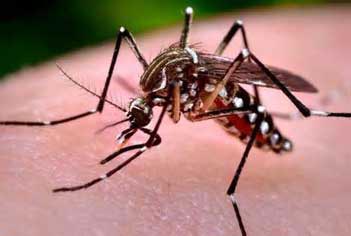A significant rise in dengue fever cases nationwide has officials deeply concerned. The looming impact of El Niño may mean even more cases as mosquito breeding grounds increase.
The provinces of Cotopaxi and Pichincha have been grappling with a concerning outbreak of dengue fever, leading to alarm and heightened vigilance within the affected regions.
The situation has been exacerbated by the looming threat of the El Niño Phenomenon, which could potentially worsen the outbreak.
Tragically, La Maná, a canton in Cotopaxi, has already witnessed two fatalities due to this mosquito-borne disease, raising fears and emphasizing the urgency of addressing the issue.
The Ministry of Health has reported the first confirmed case of dengue in the province of Pichincha, specifically in the Pedro Vicente Maldonado canton, further underlining the alarming spread of the disease.
Concurrently, La Maná in Cotopaxi has seen a significant surge in dengue cases, prompting a dire need for containment and control measures.
Christian Moreira, the district director of Health in La Maná, highlighted the gravity of the situation, revealing that over 100 cases have been registered this year alone. Disturbingly, these reported cases are likely just the tip of the iceberg, as there could be numerous undetected cases within the community.
El Niño may worsen outbreak
What exacerbates the current health crisis is the unfortunate timing of the outbreak, coinciding with the impending El Niño Phenomenon, which typically brings increased rainfall. This weather pattern could potentially facilitate the breeding and proliferation of the Aedes mosquitoes, the primary carriers of the dengue virus.
Moreover, the prevalent strain in the affected areas is dengue 2, known for its high mortality rates in South America, adding to the sense of urgency and concern.
Epidemiological data underscores the severity of the situation, with a 40% surge in dengue cases nationwide compared to the same period in the previous year. This alarming increase led the Ministry of Health to issue an epidemiological alert for several provinces, including Manabí, Santo Domingo de los Tsáchilas, and Esmeraldas.
The global health community, particularly the World Health Organization (WHO), had forewarned about the potential rise in dengue cases due to the effects of climate change and global warming.
The Aedes mosquitoes, responsible for the transmission of dengue, chikungunya, and Zika, are becoming more prevalent in South America and southern Europe due to warming temperatures.
The traditional habitats of these mosquitoes have expanded to higher altitudes, exposing previously unaffected populations to the risk of mosquito-borne diseases.
Rising temperatures have facilitated accelerated mosquito reproduction cycles, intensifying the spread of these diseases.
Dr. Raman Velayudhan, head of the WHO Tropical Diseases program, stressed the correlation between climate change and the surge in mosquito populations. He pointed out that the increasingly hot climate has provided conducive conditions for mosquitoes to breed more prolifically.
The rise in dengue and chikungunya cases observed in 2022 and early 2023 has become a cause for global concern, with countries like Paraguay, Peru, Brazil, and Argentina facing a heightened incidence of these diseases.


0 Comments